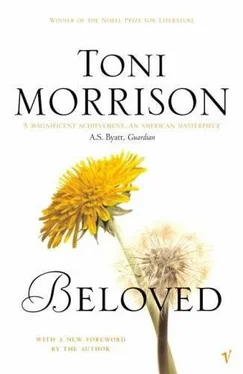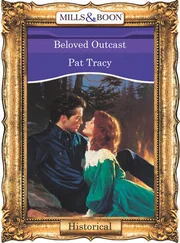Suddenly she stopped weaving and rocking and sat down, her skinny arms wrapped around her knees, her good good hands cupping her elbows. Her slow-moving eyes stopped and peered into the dirt at her feet. "That's my mama's song. She taught me it."
"Through the muck and mist and glaam To our quiet cozy home, Where to singing sweet and low Rocks a cradle to and fro.
Where the clock's dull monotone
Telleth of the day that's done,
Where the moonbeams hover o'er
Playthings sleeping on the floor,
Where my weary wee one lies
Cometh Lady Button Eyes.
Layeth she her hands upon
My dear weary little one,
And those white hands overspread
Like a veil the curly head,
Seem to fondle and caress
Every little silken tress.
Then she smooths the eyelids down
Over those two eyes of brown
In such soothing tender wise
Cometh Lady Button Eyes."
Amy sat quietly after her song, then repeated the last line before she stood, left the lean-to and walked off a little ways to lean against a young ash. When she came back the sun was in the valley below and they were way above it in blue Kentucky light.
"'You ain't dead yet, Lu? Lu?"
"Not yet."
"Make you a bet. You make it through the night, you make it all the way." Amy rearranged the leaves for comfort and knelt down to massage the swollen feet again. "Give these one more real good rub," she said, and when Sethe sucked air through her teeth, she said, "Shut up. You got to keep your mouth shut."
Careful of her tongue, Sethe bit down on her lips and let the good hands go to work to the tune of "So bees, sing soft and bees, sing low." Afterward, Amy moved to the other side of the lean-to where, seated, she lowered her head toward her shoulder and braided her hair, saying, "Don't up and die on me in the night, you hear? I don't want to see your ugly black face hankering over me. If you do die, just go on off somewhere where I can't see you, hear?"
"I hear," said Sethe. I'll do what I can, miss."
Sethe never expected to see another thing in this world, so when she felt toes prodding her hip it took a while to come out of a sleep she thought was death. She sat up, stiff and shivery, while Amy looked in on her juicy back.
"Looks like the devil," said Amy. "But you made it through.
Come down here, Jesus, Lu made it through. That's because of me.
I'm good at sick things. Can you walk, you think?"
"I have to let my water some kind of way."
"Let's see you walk on em."
It was not good, but it was possible, so Sethe limped, holding on first to Amy, then to a sapling.
"Was me did it. I'm good at sick things ain't I?"
"Yeah," said Sethe, "you good."
"We got to get off this here hill. Come on. I'll take you down to the river. That ought to suit you. Me, I'm going to the Pike. Take me straight to Boston. What's that all over your dress?"
"Milk."
"You one mess."
Sethe looked down at her stomach and touched it. The baby was dead. She had not died in the night, but the baby had. If that was the case, then there was no stopping now. She would get that milk to her baby girl if she had to swim.
"Ain't you hungry?" Amy asked her.
"I ain't nothing but in a hurry, miss."
"Whoa. Slow down. Want some shoes?"
"Say what?"
"I figured how," said Amy and so she had. She tore two pieces from Sethe's shawl, filled them with leaves and tied them over her feet, chattering all the while.
"How old are you, Lu? I been bleeding for four years but I ain't having nobody's baby. Won't catch me sweating milk cause…"
"I know," said Sethe. "You going to Boston."
At noon they saw it; then they were near enough to hear it. By late afternoon they could drink from it if they wanted to. Four stars were visible by the time they found, not a riverboat to stow Sethe away on, or a ferryman willing to take on a fugitive passenger-nothing like that-but a whole boat to steal. It had one oar, lots of holes and two bird nests.
"There you go, Lu. Jesus looking at you."
Sethe was looking at one mile of dark water, which would have to be split with one oar in a useless boat against a current dedicated to the Mississippi hundreds of miles away. It looked like home to her, and the baby (not dead in the least) must have thought so too.
As soon as Sethe got close to the river her own water broke loose to join it. The break, followed by the redundant announcement of labor, arched her back.
"What you doing that for?" asked Amy. "Ain't you got a brain in your head? Stop that right now. I said stop it, Lu. You the dumbest thing on this here earth. Lu! Lu!"
Sethe couldn't think of anywhere to go but in. She waited for the sweet beat that followed the blast of pain. On her knees again, she crawled into the boat. It waddled under her and she had just enough time to brace her leaf-bag feet on the bench when another rip took her breath away. Panting under four summer stars, she threw her legs over the sides, because here come the head, as Amy informed her as though she did not know it-as though the rip was a breakup of walnut logs in the brace, or of lightning's jagged tear through a leather sky.
It was stuck. Face up and drowning in its mother's blood. Amy stopped begging Jesus and began to curse His daddy.
"Push!" screamed Amy.
"Pull," whispered Sethe.
And the strong hands went to work a fourth time, none too soon, for river water, seeping through any hole it chose, was spreading over Sethe's hips. She reached one arm back and grabbed the rope while Amy fairly clawed at the head. When a foot rose from the river bed and kicked the bottom of the boat and Sethe's behind, she knew it was done and permitted herself a short faint. Coming to, she heard no cries, just Amy's encouraging coos. Nothing happened for so long they both believed they had lost it. Sethe arched suddenly and the afterbirth shot out. Then the baby whimpered and Sethe looked.
Twenty inches of cord hung from its belly and it trembled in the cooling evening air. Amy wrapped her skirt around it and the wet sticky women clambered ashore to see what, indeed, God had in mind.
Spores of bluefern growing in the hollows along the riverbank float toward the water in silver-blue lines hard to see unless you are in or near them, lying right at the river's edge when the sunshots are low and drained. Often they are mistook for insects-but they are seeds in which the whole generation sleeps confident of a future.
And for a moment it is easy to believe each one has one-will become all of what is contained in the spore: will live out its days as planned.
This moment of certainty lasts no longer than that; longer, perhaps, than the spore itself.
On a riverbank in the cool of a summer evening two women struggled under a shower of silvery blue. They never expected to see each other again in this world and at the moment couldn't care less.
But there on a summer night surrounded by bluefern they did something together appropriately and well. A pateroller passing would have sniggered to see two throw-away people, two lawless outlaws- a slave and a barefoot whitewoman with unpinned hair-wrapping a ten-minute-old baby in the rags they wore. But no pateroller came and no preacher. The water sucked and swallowed itself beneath them. There was nothing to disturb them at their work. So they did it appropriately and well.
Twilight came on and Amy said she had to go; that she wouldn't be caught dead in daylight on a busy river with a runaway. After rinsing her hands and face in the river, she stood and looked down at the baby wrapped and tied to Sethe's chest.
"She's never gonna know who I am. You gonna tell her? Who brought her into this here world?" She lifted her chin, looked off into the place where the sun used to be. "You better tell her. You hear? Say Miss Amy Denver. Of Boston."
Читать дальше











